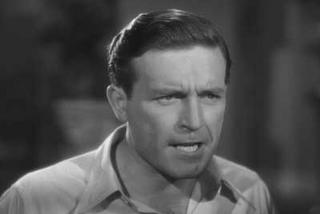Born to Kill
There isn't a single redeemable character in the entire 1947 film Born to Kill. Seriously. Not one. I suppose one or two of the people could be described as nice, but their kindness reflects their naivete instead of any sort of genuinely good nature. It's a story in which an unrepentant killer finds not one, not two but three people willing to die for him, a story in which the hero is a pathetically sleazy private detective looking for a bribe.
This is the darkest kind of film noir, a pitch-black look at amor fou (snooty cineaste for "foolish love") from one of the masters of the genre, Robert Wise. It's a wonderfully entertaining film.
That's Lawrence Tierney, best known to a young generation of film fans as gang leader Joe in Quentin Tarantino's Reservoir Dogs. In his heydey in the 40's and 50's, Tierney was best-known as a crazed alcoholic maniac who frequently became involved in barroom brawls and other violent shenanigans. (A famous anecdote, recalled on IMDB, tells of him threatening Jerry Seinfeld with a knife while performing in a cameo role as Elaine's father on "Seinfeld.")
The action of Born to Kill centers of Tierney as Sam Wilde, a, well, crazed maniac who butchers a young Reno woman he's been dating, Laury, as well as the new man in her life. With the help of his nervous and equally amoral friend Marty (the terrific character actor Elisha Cook Jr.), Sam escapes Reno for San Francisco, and marries newspaper heiress Georgia (Audrey Long). Georgia's adopted sister Helen (Claire Trevor) herself is set to marry the rich yet dull Fred (Phillip Terry), but that doesn't stop her from falling desperately in love with Sam.
By the by, the name of the dead girl in the movie is Laury Palmer, eerily close to "Laura Palmer," the name of the dead girl from David Lynch's seminal 90's soap opera "Twin Peaks." Was he inspired by Born to Kill, or is it just one of those coincidences?
Anyway, let's consider these main characters. A double-murderer. His friend and accomplice. A spoiled, self-involved rich girl. Her shallow and duplicitous sister, and her idle rich weenie of a fiance. And finally, the scumbag private detective (Walter Slezak) hired to find out who killed Laury by the victim's only friend, a batty drunk (Esther Howard).
It's not exactly an optimistic view of humanity.
Wise paints a portrait of several people crippled by their uncontrollable emotions. Helen, the crafty bride-to-be with dreams of wealth and priviledge, knows that loving a low-life criminal can ruin all her chances for security. But, of course, she can't help herself whenever he's around, and this temporary absence of rationality costs her everything.
Sam's intense animal magnetism underlines the entire film. All the women around him become drawn to him, even though he has very little to say, and doesn't really respond to any of their advances. Most of the time, when ladies lean in to kiss him passionately, he barely bothers to move forward. As several men will ask during the course of the film, including Slezak's (overweight) detective in one of the film's cannier and best-written scenes, what is the attraction? Are women irresistably drawn to this man because of his primal, violent nature? Is it his aggressiveness, or is it his quiet, stoic and sedate social manner?
Or perhaps the answer is as simple as Georgia insists - that Sam is unlike any other man she has ever met. Certainly his cold, aloof manner, his snide, sarcastic sense of humor and his irrational temper would place him in the category of unique finds, but whether or not that equals the kind of raw animalistic lust is a question I'll leave for another post.
Whatever the reason, these women (and Marty) become drawn further and further into Sam's world, and it's a world of lies, anger and cowardice. No one likes where they end up, except for Slezak's detective, Arnett, who takes part in the action of the film but also seems to glide above the surface of the degredation, somehow separate from all the villainy.
Even when begging Helen for a bribe, threatening to reveal Sam to the police even though he has little or nothing to gain, Arnett fails to sink to the level of Sam and his cohorts. He may be what he refers to as a "scoundrel," but he doesn't actually cause anyone immediate harm. His actions may pervert justice, but in the scummy underworld of Born to Kill, where everyone is guided only by their base impulses, the simple perversion of justice seems a relatively minor offense.

1 comment:
Lynch was actually inspired by the film Laura for Twin Peaks, though the coincidence is, indeed, startling.
Post a Comment